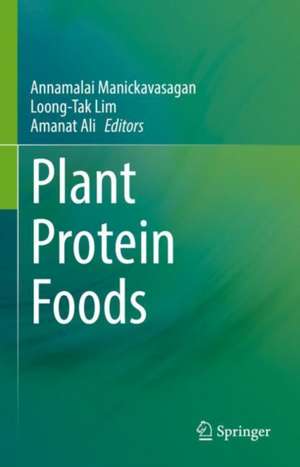Plant Protein Foods
Editat de Annamalai Manickavasagan, Loong-Tak Lim, Amanat Alien Limba Engleză Hardback – 29 mar 2022
Regular consumption of plant-based protein foods instead of animal-based protein foods reduces the risk factors for cardiovascular diseases, diabetes and certain cancers. Apart from human health, the adverse effects to the environment due to the production of protein is much higher for animal sources than plant sources. Greenhouse gas emissions from the production of one pound of lamb meat, for example, are thirty times higher than one pound of lentils.
As consumers are increasingly aware of personal health and environmental impact of food production, the demand for plant protein foods is increasing globally. This trend has prompted several large-scale collaborative research projects on plant-based protein products supported by the industry and governmental agencies. Several established multinational meat companies have started adding plant-protein product lines to meet the current demand.
This book presents the first comprehensive compilation of literature on plant-based protein foods. Chapters cover protein extraction technologies from plants, comparison of amino acid profiles of plant- and animal-based proteins, approaches to product development for plant-based protein products, health benefits of plant-based protein foods, market opportunities, and future challenges. Plant Protein Foods is an essential reference for consumers, students, researchers, food manufacturers and other stakeholders interested in this domain.
| Toate formatele și edițiile | Preț | Express |
|---|---|---|
| Paperback (1) | 1121.65 lei 6-8 săpt. | |
| Springer International Publishing – 30 mar 2023 | 1121.65 lei 6-8 săpt. | |
| Hardback (1) | 1126.86 lei 6-8 săpt. | |
| Springer International Publishing – 29 mar 2022 | 1126.86 lei 6-8 săpt. |
Preț: 1126.86 lei
Preț vechi: 1374.22 lei
-18% Nou
Puncte Express: 1690
Preț estimativ în valută:
215.65€ • 234.16$ • 181.15£
215.65€ • 234.16$ • 181.15£
Carte tipărită la comandă
Livrare economică 22 aprilie-06 mai
Preluare comenzi: 021 569.72.76
Specificații
ISBN-13: 9783030912055
ISBN-10: 3030912051
Pagini: 519
Ilustrații: XIII, 519 p. 51 illus., 30 illus. in color.
Dimensiuni: 155 x 235 mm
Greutate: 0.96 kg
Ediția:1st ed. 2022
Editura: Springer International Publishing
Colecția Springer
Locul publicării:Cham, Switzerland
ISBN-10: 3030912051
Pagini: 519
Ilustrații: XIII, 519 p. 51 illus., 30 illus. in color.
Dimensiuni: 155 x 235 mm
Greutate: 0.96 kg
Ediția:1st ed. 2022
Editura: Springer International Publishing
Colecția Springer
Locul publicării:Cham, Switzerland
Cuprins
1. High protein foods: A comparison of animal origin vs plant origin foods
2. An overview of plant-based protein rich products
3. Processing technologies to produce plant protein concentrates and isolates
4. Product development technologies for plant protein-based foods
5. Enrichment and fortification of traditional foods with plant protein isolates
6. Plant-based meat analogues and modified meat extenders
7. Fermented plant protein products
8. Extruded protein films / non-textured protein products
9. Plant protein based drinks / beverages
10. Sensory and physical properties of plant protein foods
11. Amino acid profile and bioavailability of plant-based protein rich products
12. Nutritional quality, health implications of plant-based protein rich foods
and/or
Plant protein foods in the prevention and management of non-communicable diseases
13. Anti-nutritional factors and biological constraints in the use of plant protein isolates and concentrates
14. Safety and regulation requirements for plant-based protein rich foods
15. Meat replacers and meal plans based on plant protein isolates for human consumption
16. Global trends in the use of plant protein foods: Awareness, availability and consumption
17. Marketing opportunities for plant-based protein products
Notă biografică
Annamalai Manickavasagan is an Associate Professor of Food Processing and Product Development at the University of Guelph in Guelph, Canada.
Loong-Tak Lim is a Professor of Food Packaging and Materials Science at the University of Guelph.
Amanat Ali is a Visiting Research Professor of Human Nutrition at the University of Guelph.
Textul de pe ultima copertă
Regular consumption of plant-based protein foods instead of animal-based protein foods reduces the risk factors for cardiovascular diseases, diabetes and certain cancers. Apart from human health, the adverse effects to the environment due to the production of protein is much higher for animal sources than plant sources. Greenhouse gas emissions from the production of one pound of lamb meat, for example, are thirty times higher than one pound of lentils.
As consumers are increasingly aware of personal health and environmental impact of food production, the demand for plant protein foods is increasing globally. This trend has prompted several large-scale collaborative research projects on plant-based protein products supported by the industry and governmental agencies. Several established multinational meat companies have started adding plant-protein product lines to meet the current demand.
This book presents the first comprehensive compilation of literature on plant-based protein foods. Chapters cover protein extraction technologies from plants, comparison of amino acid profiles of plant- and animal-based proteins, approaches to product development for plant-based protein products, health benefits of plant-based protein foods, market opportunities, and future challenges. Plant Protein Foods is an essential reference for consumers, students, researchers, food manufacturers and other stakeholders interested in this domain.
Caracteristici
Presents the first comprehensive compilation of literature on plant-based protein foods
Also discusses consumer trends, marketing opportunities, and future challenges for plant-based protein products
Cover protein extraction technologies
Also discusses consumer trends, marketing opportunities, and future challenges for plant-based protein products
Cover protein extraction technologies
